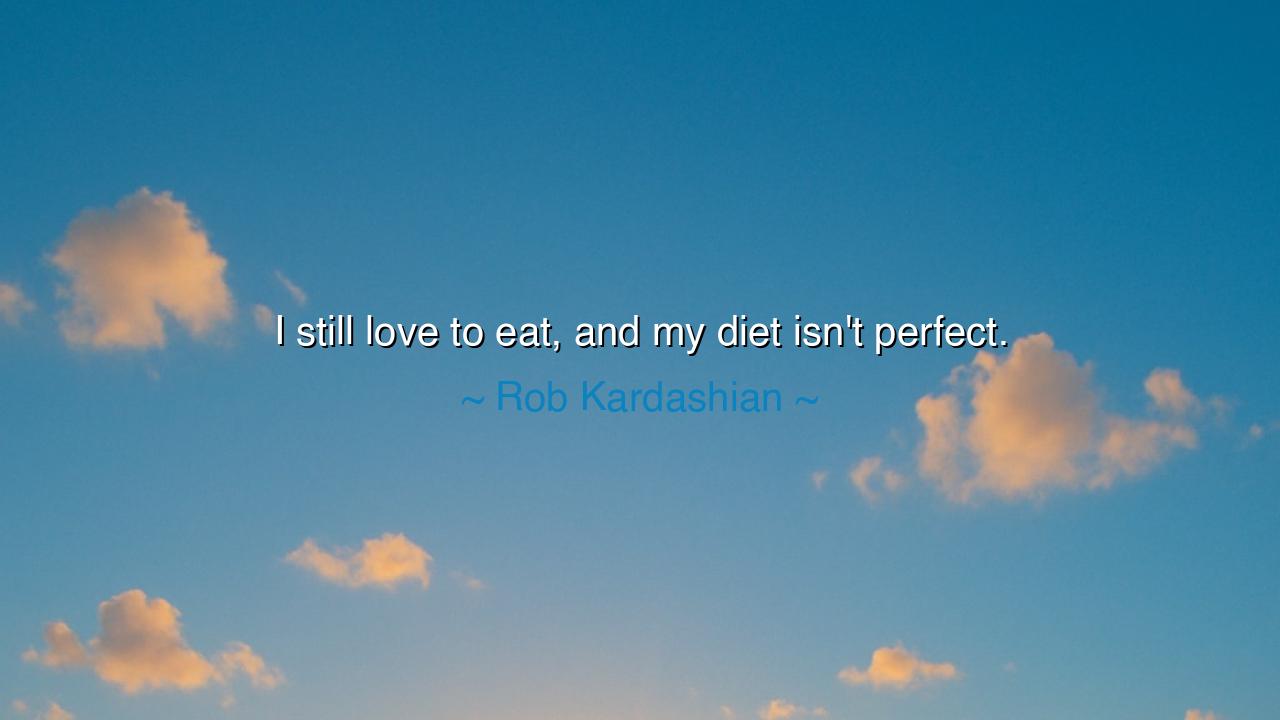
I still love to eat, and my diet isn't perfect.






In the simple yet profoundly human words of Rob Kardashian, we hear an echo of one of life’s deepest truths: “I still love to eat, and my diet isn’t perfect.” To some, these words may seem ordinary, almost casual — but beneath them lies a wisdom both tender and timeless. For they speak not merely of food, but of the balance between discipline and acceptance, between the striving for betterment and the grace of imperfection. In this confession, there is honesty — the kind that humbles pride and reveals that all human effort, however noble, must coexist with our natural desires.
The origin of this quote arises from Kardashian’s journey through fame, pressure, and self-reflection. Known to the world not only as a member of a celebrated family but as a man who has wrestled openly with health and self-image, his words become more than a statement about eating — they become an admission of humanity. He acknowledges that despite efforts to change, to control, to refine, the love of life’s pleasures remains. And in that love, there is no shame. His voice joins the chorus of every soul who has ever tried to perfect themselves, only to discover that perfection is neither possible nor necessary — that joy, even in imperfection, is part of what makes us whole.
The ancients knew this lesson well. The philosopher Epicurus, so often misunderstood as a champion of indulgence, actually taught that true happiness lies in moderation — in enjoying the pleasures of life without allowing them to rule us. He did not forbid pleasure; he sanctified it when balanced with wisdom. “Do not spoil what you have,” he wrote, “by desiring what you have not.” In Kardashian’s humble statement, we find the same spirit — the acknowledgment that to love food, to delight in the simple act of eating, is no sin. It is a recognition of our mortal condition: that we are creatures of flesh and spirit, and that the health of one cannot exist without compassion for the other.
Consider also the story of Socrates, who was once asked how best a man might care for himself. He replied, “By knowing himself.” Socrates did not preach asceticism or indulgence, but self-awareness — to know one’s nature, to understand one’s limits, and to act in harmony with them. Rob Kardashian’s words reflect this same awareness. He knows his imperfection, and he accepts it without despair. To admit that one’s diet is not perfect is to confess humbly that one is still learning, still human, still walking the long road between aspiration and acceptance. It is a confession that becomes, paradoxically, an act of strength.
For there is heroism in honesty, especially in a world that demands illusion. Many seek to appear flawless — in body, in behavior, in discipline — yet it is in imperfection that truth dwells. Kardashian’s statement reminds us that to love oneself does not mean to excuse one’s flaws, but to see them clearly without hatred. The one who says, “My diet isn’t perfect,” says also, “But I still choose to live, to enjoy, to continue.” This is the voice of perseverance, the strength to embrace progress without punishment. The ancients would have called this temperance, the virtue that keeps the soul at peace in both abundance and scarcity.
Let us remember, too, that eating — in its truest form — is an act of communion, not merely with food, but with life itself. To love eating is to love existence, to celebrate the senses through which we experience the world. The poet Horace once wrote of the “golden mean,” the balance between luxury and deprivation. He urged men not to feast like kings, nor starve like ascetics, but to dine with gratitude, sharing bread and laughter with others. In this spirit, Rob Kardashian’s words can be seen as a reminder that joy, even in imperfection, is a sacred part of life’s rhythm.
So, my child of the future, take this teaching as your own: seek balance, not perfection. Strive to nourish your body, but do not starve your soul. Eat with mindfulness, not guilt. Work toward discipline, but leave room for delight. When you stumble, as all do, do not curse your weakness — learn from it, forgive it, and begin again. For perfection is not the goal of the wise; peace is. And peace is found not in denial, but in understanding.
In the end, Rob Kardashian’s words are not about food at all, but about acceptance — the grace of being human. To love to eat, to admit imperfection, is to stand humbly before life and say, “I am learning.” And in that humility, one becomes strong. For the greatest diet of all is not the one that shapes the body, but the one that feeds the spirit — with patience, laughter, gratitude, and love for this imperfect, beautiful world that sustains us all.






AAdministratorAdministrator
Welcome, honored guests. Please leave a comment, we will respond soon